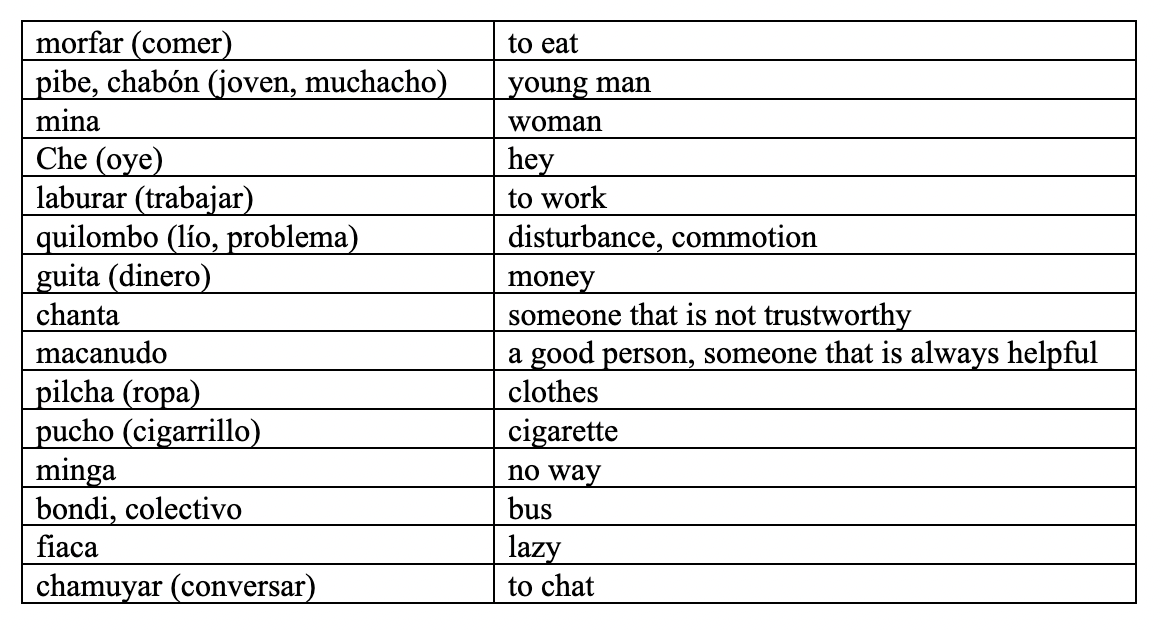Let's see the most distinctive features.
Pronunciation
- A peculiar form of yeismo. Yeísmo is a mode of pronunciation characteristic of several regions that consists of pronouncing the LL (“elle”) in the same way as the Y (“ye”). In this way, yeísmo leads to saying “cabayo” instead of “caballo” and “zapayo” instead of “zapallo”.
- Seseo: We don´t use the voiceless interdental fricative consonant /θ/ . In Spain it distinguishes the spelling c or z from the written [s] s. In Buenos Aires Spanish this causes numerous cases of hominy that do not exist in peninsular Spanish, and has therefore led to changes in the vocabulary. For example: terms such as “cocer” (cooking) or “caza” (hunting) are homophones with “coser” (sewing) and “casa” (house) respectively, and the former is always replaced by “cocinar”.
Voseo
The substitution of the standard second person singular pronoun tú by vos, as an accepted form in the spoken and written dialect. The phenomenon also carries modifications in the conjugation of verbs.
The form usted remains unchanged; as in the Iberian Peninsula, and unlike other Latin American dialects, it has a value of respect and is extremely unusual among speakers who know each other, in informal contexts, and among relatives. On the contrary, the plural ustedes replaces vosotros in all cases, losing the distinction between family and respect forms.
Although the verb conjugation for the pronoun vos appears to vary only in stress from the standard form (showing the pattern tú amas > vos amás, tú comes > vos comés), it actually closely follows the classical form of the second plural person amar, comer (to love, to eat), in which the diphthong has elided its second term. In verbs in which the root shows vowel alternations with the conjugation, this difference is preserved in the form of vos, which maintains the vowel of the infinitive. For example, tú mientes (you lie), but vos mentís (you lie).
Verbal inflection
- The periphrastic forms of the past like the preterite perfect (he vivido) and the past preterite (hube vivido) are very rare in Castellano Rioplatense, although they appear in written use. They are usually replaced by past simple (viví).
- The future simple conjugated form has disappeared. It is replaced by a periphrasis, made with the modal verb ir (to go) + the infinitive of the verb. For example, iré is replaced by voy a ir (I will go > I am going to go), comeré is replaced by voy a comer (I will eat > I am going to eat). The use of the future with predictive value is maintained: ¿Qué hora será? (What time will it be?) ¿Habrán ganado el partido? (Will they have won the match?)
Lunfardo
Lunfardo is a slang, a popular speech created outside the official vocabulary.
- It was formed between 1870 and 1880, when the first batches of European immigrants began to arrive, specifically Italians. In the first stage, lunfardo contains approximately 50 percent of standard Italian words, which would be Tuscan or Genoese. They are the two languages that contribute the most to lunfardo during its first 30 years of existence.
- In other cases there is a complete adaptation to the phonetics of the Spanish speaker from the Río de la Plata. And there is, furthermore, a previous popular vocabulary, made up of words that did not come from Italian but were taken from popular speech, or from the speech of African slaves, Brazilianisms, or words from the rural area, possibly Spanish originally but later they passed through gaucho literature.
- The lunfardo formed a linguistic synthesis, a living memory of the history of Argentina, which accounts for the different social groups that have shaped our country and remind us at every moment who we are and where we come from.
- This is the only popular vocabulary in the world formed originally and in a high percentage by immigrant terms, brought by European immigrants, especially Italians and Spanish, but the successive internal migrations to the city of Buenos Aires and Greater Buenos Aires should not be forgotten, which took place in Argentina in particular during the first half of the 20th century. Lunfardo received the contribution of aboriginal languages.
Some lunfardo words:








